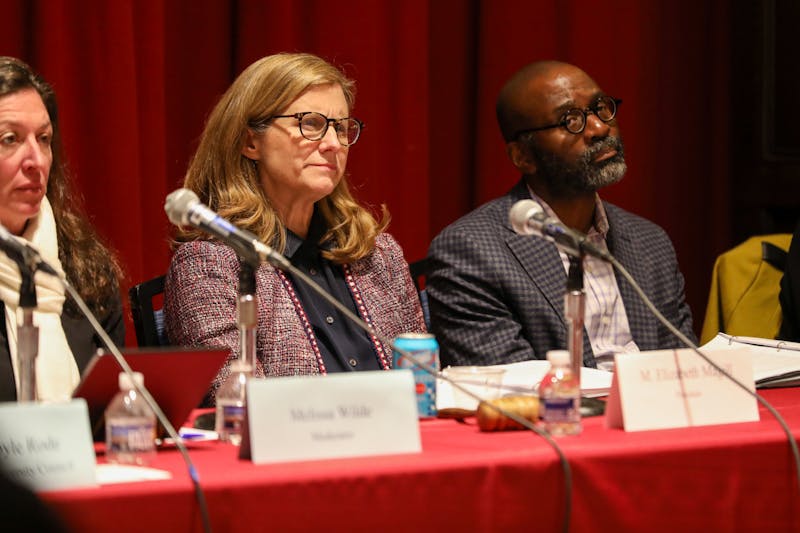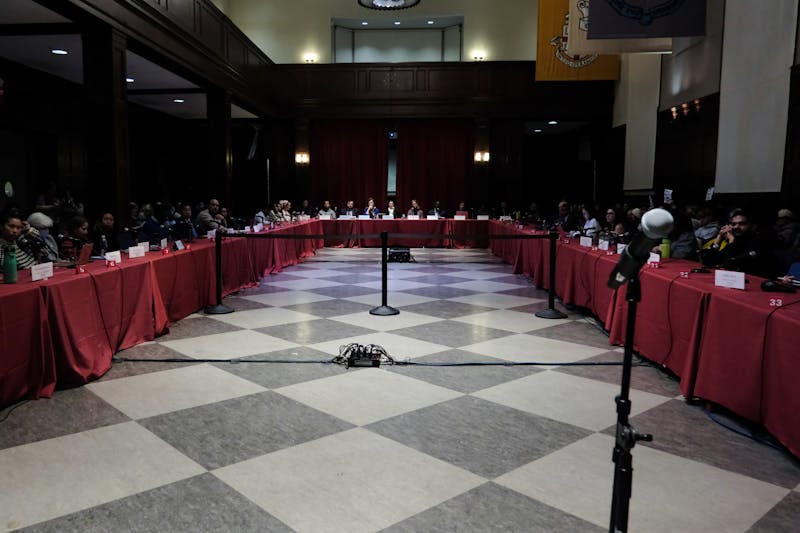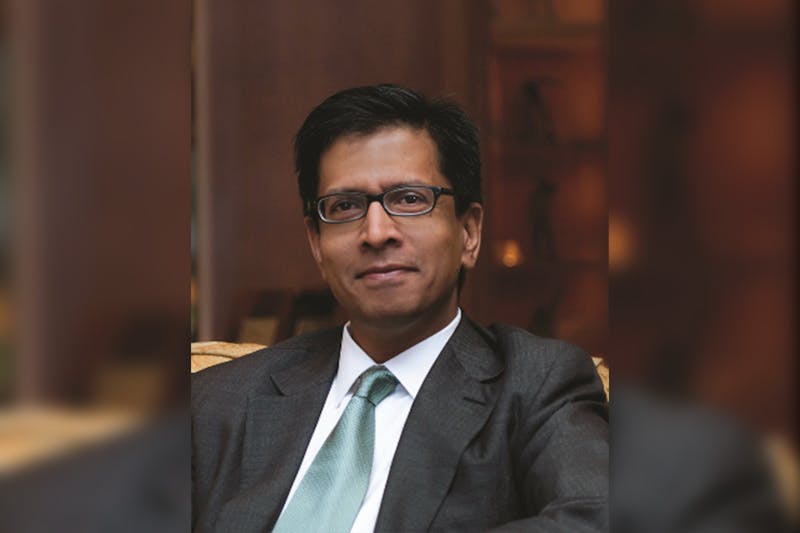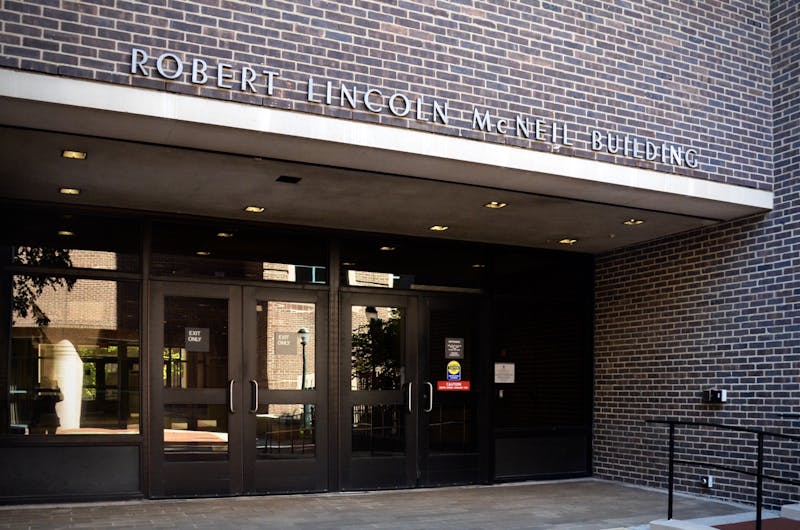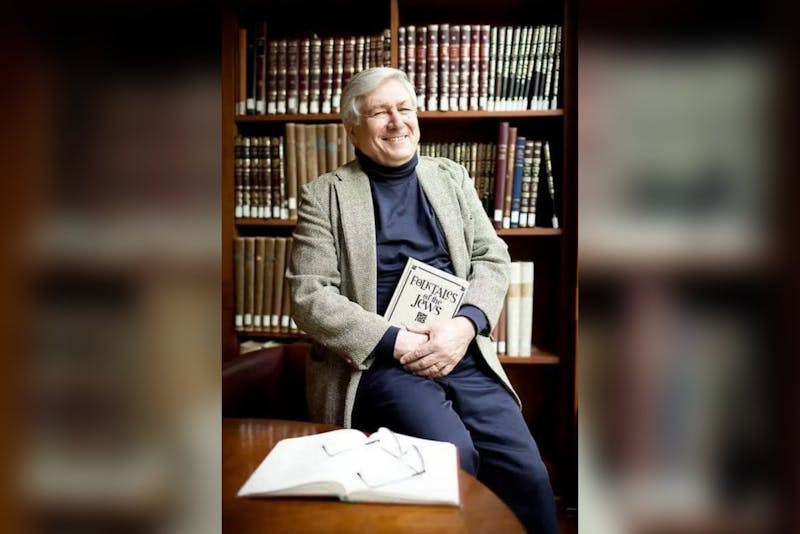
Founding faculty director of the SNF Paideia Program, Michael Delli Carpini, was honored in an event on Jan. 29 (Photo from Constance Mensh).
The Stavros Niarchos Foundation Paideia Program hosted a ceremony honoring their inaugural founder, Annenberg Faculty Director Michael Delli Carpini.
The drop-in event honoring Delli Carpini, an Oscar H. Gandy emeritus professor of communication & democracy, took place at Sweeten Alumni House on Jan. 29. Approximately 80 people attended the event, which featured remarks from Interim President Larry Jameson, SNF Paideia faculty, and student fellows.
SNF Paideia is a five-year pilot program designed to provide undergraduate students with the knowledge and skills needed to become engaged "community members" and lead "fulfilling civic lives." Delli Carpini served as the program's inaugural faculty director until he was succeeded by Penn GSE Professor Sigal Ben-Porath in Sept. of last year.
President Jameson spoke at the event about the SNF Paideia program's message, and the impact that Delli Carpini has made through its implementation. He described the program as a "framework for us to think about how we engage, hear, heal, and honor one another.”
“The hearing part especially is so critical: to be able to listen carefully and understand what another person’s point of view is before we necessarily respond,” he added. “I’m hoping that [Delli Carpini] has created something we can build upon and expand in some very powerful ways.”
The SNF Paideia Program is based on four key pillars: dialogue, service, wellness, and citizenship. Through co-curricular programming and a collaborative university-wide network of faculty, and staff, the program offers designated Paideia courses, workshops, public-interest initiatives, and a fellows workshop that contributes to its educational goals.
Brinn Gammer, a College senior and an SNF Paideia fellow, spoke about the ways that the SNF Paideia program has supported her academic career.
“I got to be a researcher at a fantastic university in Chile, take independent Spanish lessons, and had the opportunity over this past break to complete an independent research project in Mexico,” she said.
The program initially received a $6 million grant from SNF to launch. Last fall, it received a $13 million grant to support growth in its dialogue and civic engagement offerings.
College junior and SNF Paideia fellow Zachary Koung reflected on his time in the program, and the impact it had on him. He said that the program has given him "hope" through its resources, staff, courses, and cohort setup.
“It’s given me hope for a better tomorrow. It’s given me hope that things can change. And most importantly, it’s equipped me with the knowledge and tools to leave Penn ready to make a difference in the world,” he said.
At the event, Delli Carpini was given an olive tree sculpture as a gift of gratitude on behalf of SNF Paideia’s team and the university. Gifted from the SNF Paideia Cultural Center, the olive tree is both a nod to the olive trees and gardens surrounding the center, and an ancient Greek symbol of peace and friendship, according to the SNF Paideia team.
In his speech, Delli Carpini recognized several organizations that the SNF Paideia program has learned from and partnered with, including the Netter Center, Fox Leadership Program, PORES, the Andrea Mitchell Center, and Civic House.
“I'm proud of the work that I was able to accomplish,” Delli Carpini said. “This could not have happened without the help, and involvement, and creativity, and commitment of a whole number of organizations and people,” he said.
Delli Carpini also reflected on the program's current relevance, saying it was "needed when it was founded five years ago" and "needed even more now.”
“This is a real fraught moment that we're in," he said. "But I think this program will play an important role in the future of Penn and hopefully beyond Penn.”
The Daily Pennsylvanian is an independent, student-run newspaper. Please consider making a donation to support the coverage that shapes the University. Your generosity ensures a future of strong journalism at Penn.
Donate







